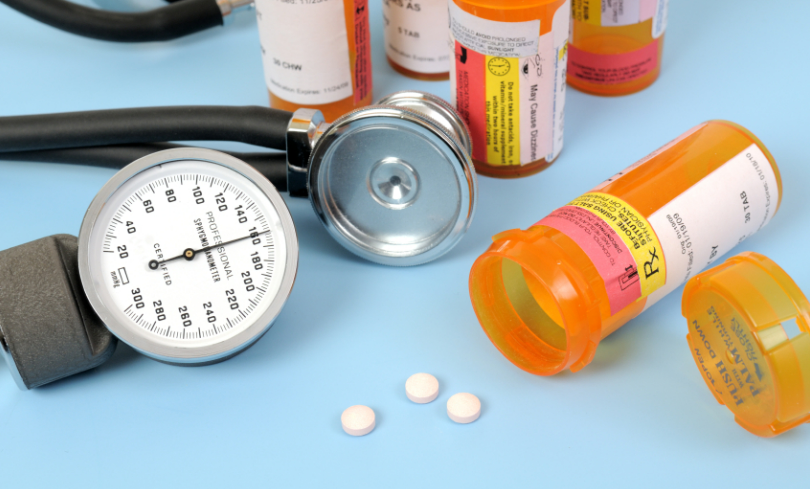Many drugs are available to treat high blood pressure. Choosing the right one can be tricky. Learn how to find the best one for you.
By Mayo Clinic Staff
There are many different high blood pressure medications (antihypertensives) available, each with pros and cons. Your health care provider might prescribe more than one type to treat your condition.
Taking your medications as prescribed, monitoring your blood pressure and making lifestyle changes can help you reach and maintain a healthy blood pressure.
Lifestyle changes
If you’re beginning to develop high blood pressure (prehypertension) or if you already have it, lifestyle changes may help you reduce or eliminate your need for medication.
Try these steps to help lower and control blood pressure.
- Eat a healthy diet with plenty of fruits and vegetables.
- Reduce the amount of salt (sodium) in your diet.
- Don’t smoke.
- Manage stress.
- Maintain a healthy weight.
- Get regular exercise. Aim for 30 minutes of moderate activity on most days of the week. It’s OK to break up your activity into three 10-minute sessions a day.
- Avoid or limit alcohol. If you choose to drink alcohol, do so in moderation. For healthy adults, that means up to one drink a day for women and up to two drinks a day for men.
Medication options
If making lifestyle changes isn’t enough to control your blood pressure, your health care provider will likely prescribe blood pressure medication. You may be given one or more of these medications:
- Water pills (diuretics).A diuretic removes excess water and sodium from the body, so there’s less fluid flowing through the veins and arteries. This reduces pressure on the walls of the blood vessels.
Types of diuretics include thiazide, loop and potassium-sparing. If diuretics aren’t enough to lower blood pressure, a health care provider might recommend adding other blood pressure medications to your treatment.
- Angiotensin-converting enzyme (ACE) inhibitors. These help relax blood vessels by preventing the formation of a body chemical (angiotensin) that narrows blood vessels.
- Angiotensin 2 receptor blockers (ARBs).These drugs block the action of angiotensin.
- Calcium channel blockers. These medications prevent calcium from entering the cells of the heart and arteries, allowing the arteries to relax and open.
- Beta blockers. These drugs work by blocking the effects of the hormone epinephrine, also known as adrenaline. They cause the heart to beat slower and with less force.
- Renin inhibitors. Renin is a substance produced by the kidneys that triggers a series of steps that increases blood pressure. Renin inhibitors slow the production of this substance.
Other medications sometimes used to treat high blood pressure
If you’re not able to reach your blood pressure goal with one or more of the above medications, other drugs that lower blood pressure include:
- Alpha blockers. Alpha blockers prevent the hormone norepinephrine (noradrenaline) from tightening the muscles in the walls of smaller arteries and veins, which causes the vessels to remain open and relaxed.
- Alpha-beta blockers. Alpha-beta blockers work similarly to beta blockers. They might be prescribed if you have high blood pressure and are at risk of heart failure.
- Central-acting agents. These medications prevent the brain from sending signals to the nervous system to speed up the heart rate and narrow the blood vessels. As a result, the heart doesn’t pump as hard and the blood flows more easily through the veins and arteries.
- These medications prevent the muscles in the veins and arteries from tightening and narrowing. As a result, blood flows more easily and the heart doesn’t have to pump as hard.
- Aldosterone antagonists. These medications are often used with other drugs, such as a diuretic. Aldosterone antagonists block the hormone aldosterone, which sometimes causes salt and fluid retention, contributing to high blood pressure. They are usually prescribed for those whose high blood pressure is difficult to control or who have diabetes or heart failure.
How well a drug works depends on the person’s age, sex, race, blood pressure level and overall health.
Combining two drugs usually works better than a single drug to get blood pressure under control. Sometimes additional medication is needed to achieve a blood pressure goal.
High blood pressure drugs and other health conditions
High blood pressure often goes hand in hand with other health problems. High blood pressure increases the risk of having one of these conditions:
- Chronic kidney disease
- Coronary artery disease
- Diabetes
- Heart attack or stroke
- Heart failure
- Swelling or thickening of the left chamber of the heart (left ventricular hypertrophy)
However, a targeted treatment approach might reduce the risk of these conditions.
For example, if you have chest pain (angina) related to coronary artery disease, your health care provider may recommend a beta blocker to lower your blood pressure, prevent chest pain, reduce your heart rate and decrease your risk of death.
If you have diabetes and high blood pressure, taking a diuretic plus an ACE inhibitor may decrease your risk of a heart attack and stroke.
If you have diabetes, high blood pressure and kidney disease, you may need an ACE inhibitor or an angiotensin 2 receptor blocker.
Reaching your blood pressure goal
A combination of lifestyle changes and medication is often needed to help control blood pressure. However, it’s not unusual to try several medications or doses before finding what works best for you.
Monitoring your blood pressure at home can help you and your health care provider know if your treatment is working. Home blood pressure monitors are widely available and inexpensive, and you don’t need a prescription to buy one. Remember that home blood pressure monitoring isn’t a substitute for visits to your health care provider.
Original Article – https://www.mayoclinic.org/diseases-conditions/high-blood-pressure/in-depth/high-blood-pressure-medication/art-20046280





